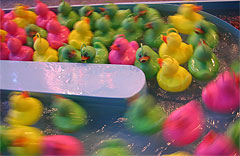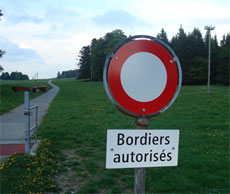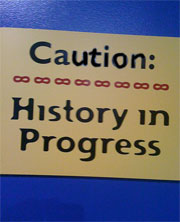The Group
On the way home from school, Short-pants told me about the group.
“I need to wear grown-up clothes tomorrow,” she announced, “because I’ve been asked to join a group.” Her enthusiasm was fierce; she was proud to have been invited. I asked her to tell me about the group. “I don’t know,” she said, “I just know who’s in it, and we’re supposed to wear grown-up clothes.”
After a moment of reflection, I decided to offer, carefully, an unsolicited opinion. I told her how I belong to a few different groups: teams I work with, professional associations, friends from school, from college, from Paris. I told her how groups are good for sharing common interests and getting support and having fun, as long as membership in them doesn’t require being rude to others to or excluding people in an unfair or mean-spirited way. Then I asked her, “Do you think this group is like that?”
“No Mama.”
“Well good, then,” I said. We started brainstorming what kind of grown-up outfit we might put together for her to wear that next day.

I guess this is the age when social groups become more clearly delineated. Instead of being part of a mass identity of the children, small clusters of like-minded, like-interested, informal clubs begin to form, not always with the best intention. I remember when I was a little bit older than Short-pants, a group of tough girls used to select a classmate at random, the tauntee-du-jour, and for any kind of reason they could invent, pick on her and lobby the other students to ignore her, or worse, to mock and ridicule her along with them. I lived in fear that I would become their target. I remember once they taunted a homely girl who was a Jehovah’s Witness, circling and kicking dirt at her in the playground. I didn’t participate, but I stood by and watched them jeer at her without saying a word or stepping in. Later that night, I felt like I should tell my mother about it, but I didn’t. I was too ashamed.
I still regret that.
In high school, I ran with a pretty congenial group. We might have been a clique, but I don’t believe we were intentionally cruel to anyone. (I say that, but my memory may be selective.) One of my friend’s parents owned a motel, and on graduation weekend they let the senior class take it over for a huge party. We barbecued, drank beer (the drinking age was 18 back then) and did our own fatiguing version of Paradise by the Dashboard Light, singing into beer bottles as if they were microphones. When someone suggested a midnight swim, I went to get my bathing suit and it was nowhere to be found. Someone loaned me another, but the next day I found mine crammed into the toilet of one of the furthest motel rooms. The perpetrator, we believed, was a girl from another group, a group made up of some of those same taunting girls from earlier in my childhood.
It hurt. It wasn’t the first time I was picked on or teased, but there was something violent – or violating – about it. I suppose it says something that I remember it now, decades later.
Maybe I should tell that story to Short-pants.

I’m stunned at the vitriol between groups – political groups – in the United States right now. I imagine this was the tenor of things during the civil rights movement, but I was shielded from that by my parents, good old-fashioned Rockefeller Republicans, a breed that seems to be an endangered species these days. By the time I came of political age, things were tamer. The Democrats and Republicans disagreed, but the reaching across the aisle that Obama aspires to was not so extraordinary, a little quid-pro-quo-cross-parties was the natural order of being effective in Washington. I think it was like that. Wasn’t it?
Most of my friends supported the passage of the health care reform bill. I also know people who opposed it. But I cannot imagine any of them – on either side of the debate – lashing out at the other side with such venom and physical violence. Threatening the safety of the representatives who supported the bill? Vandalizing their homes and offices? Harassing their families? Bullying everyday citizens simply because they support Obama or the health care reform? I realize that my view of America  is shaped by idealistic text-books from the 1970s, but this is not how I understood our democracy to operate. Was I fooled by those cheezy film-strips (beep) or has the typical American’s respect for the rule of law changed so dramatically in the nearly twenty years I’ve lived abroad? Since when is freedom of speech interpreted as the right to be downright rude, to insult, slander and cause physical damage to people in the other group, the ones who think differently. How can it be okay to hate and hurt like this? Not only can groups be mean. They can be dangerous.
is shaped by idealistic text-books from the 1970s, but this is not how I understood our democracy to operate. Was I fooled by those cheezy film-strips (beep) or has the typical American’s respect for the rule of law changed so dramatically in the nearly twenty years I’ve lived abroad? Since when is freedom of speech interpreted as the right to be downright rude, to insult, slander and cause physical damage to people in the other group, the ones who think differently. How can it be okay to hate and hurt like this? Not only can groups be mean. They can be dangerous.
The next morning, Short-pants crawled in beside me for her morning cuddle. We started to talk about her wardrobe and what she should select to wear to look grown-up. She wasn’t very responsive to my questions.
“There’s another thing,” she told me, “they said if I want to be in the group, I have to change my hair.” This would mean removing the broccoli-like ponytail she’s taken to wearing, the one that sticks straight up, just over her forehead.
“How to you feel about that?” I asked.
“Well, I like my hair this way.”
We went over her choices, listing the different ways she could respond: Change her hair and join, keep her hair and not join, keep her hair but ask if she could still join. Were there other choices? Maybe, she thought. She wanted some time to think about it.
Later, at breakfast, with a mouthful of pancakes, she told me her decision.
“I think I’m going to tell them thanks but I don’t want to be in the group after all.” She tugged on her vertical ponytail.
My daughter, it seems, has the makings of an Independent.